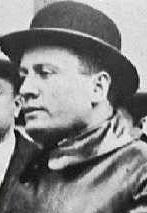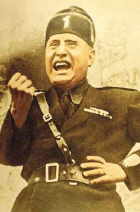How many of the twentieth-century's vicious dictators also wrote a bodice-ripping historical novel? The answer is at least one, that one being Il Duce himself, Benito Mussolini.
In 1909, the future leader of Italy was secretary to a trade union organisation in Trent, and assisting the editor of the local socialist newspaper Il Popolo and its weekly supplement La Vita Trentina. For La Vita Trentina he wrote a serial, the extravagantly titled Claudia Particella, l'Amante del Cardinale: Grande Romanzo dei Tempi del Cardinale Emanuel Madruzzo. Apparently the story was popular with the readers of the magazine, but with the passage of time it was forgotten and it was not until 1929, after he had been in power for more than six years, that it was rediscovered and published in book form, with English and German editions appearing shortly after.
Mussolini's story is about a historical figure, Emanuel Madruzzo, Cardinal of Trent during the papal reign of Alexander VII (1655-1667), his mistress Claudia Particella, and the unhappy course of their love affair. Madruzzo wants to resign his cardinalcy and legitimise the relationship, but the pope will not permit it; meanwhile the couple's enemies inside and outside of the church are increasing in number and determination, as first Emanuel lavishes the town's wealth on Claudia then compounds his sin by carelessly bringing about the death of his niece and hiding her body. The dastardly Don Benizio could help them, but only if Claudia will yield to his lusts: she spurns him, sealing her fate. Assassins are recruited and several attempts are made on her life; finally they succeed in drugging her wine and she dies. Madruzzo lives on, presumably unhappily ever after.
You may gather from my synopsis that this is not great literature, nor would you expect it to be, given its author. But a book does not have to be great literature to be worth reading, if it has, say, a fast-moving plot, interesting characters, humour - intentional or otherwise - or a smattering of lubricious sex. None of these things are to be found here, sadly.
The plot wanders, betraying both its nature as a serial publication and its author's lack of serious interest in his story. A similar carelessness mars his characterisation, so that it is hard to say whether his two protagonists are supposed to be sympathetic or not. He does not really care what they do, or what happens to them: it seems that he is writing about them only because the historical setting provides an excuse for lengthy anti-clerical rants, and to portray the lust, vengefulness and murderousness of their adversaries. For him, love is merely a convenient motivating device that can be evoked by well-worn formulae, while hate is real.
Mussolini the dictator has often been portrayed as a comical figure, but there is not much fun in this book. The prose is often purple and overblown but it is rarely silly enough to be amusing (of course the Italian original may be different in this respect, but not being able to read it, I can't say). But here is one of the few truly enjoyable over-the-top passages, part of Don Benizio's vain attempt to seduce the lovely Claudia:-
Don Benizio wept like a boy. And like a boy he knelt at Claudia's feet. With broken phrases, interrupted by terrible groans which burst from his breast, with words which were in turn puerile, disordered, suave, and terrible, with the desperate gestures of one who has been crushed, he begged love, pardon, pity.
“Do not cast me into the abyss. Do not make me drain the bitter cup of vengeance. Cast a ray of your light into my darkened soul.”
Then phrases of mystic adoration hurtled past his lips.
“I will build you a secret altar in the depths of my conscience. You will be the Madonna of the temple within me. I will be your slave. Strike me, despise me, beat me, open my veins with a subtle dagger, but grant me the revelation of yourself, grant that I may speak to you, grant that I may lose myself with you in the supreme illusion.”
But Don Benizio's eloquence did not move Claudia. Then the priest returned to thoughts of vengeance.
“Ah, you do not listen to me, shameless courtesan, harlot. Well, I shall come to get you in this same castle. I shall let the common brutes of the market-place satiate their idle lusts on your sinful body. You shall be the mockery of the unreasoning mob. Your corpse will not have the rites of Christian burial. You will be cast into the field of the Badia with the witches. And when the hour of your agony comes, when, trampled on, transfixed and rent by the blows of the mob, you shall implore aid and succour with the eyes which now so disdainfully regard me, I shall be the evil demon of that supreme hour, I shall come to torture you with memories of me, to gloat in my triumph.”
One nice image there: where those 'phrases ... hurtled past his lips', and elsewhere there are other occasional happy coinages, such as where some prelates are 'eyeing her with hostile snouts', but mostly it is tedious bombast without even such dodgy metaphors to lighten it.
The preface to the English edition, by the translator Hiram Motherwell, says that this was Mussolini's sole excursion into fiction, apart from one, reportedly morbid, short story. One must assume that despite the supposed success of his serial with readers of La Vita Trentina, he did not see himself as a historical novelist, perhaps because he was aware of his limitations as a writer: if so, the lazy pop-psychological explanation of the dictator as frustrated artist will not fit in this case.
That it is not a more interesting book is a shame: one would like, in answer to the query: “What are you reading at the moment?”, to be able to answer smugly: “The Cardinal's Mistress, by Benito Mussolini”, and hint by smirk and wink that this is the sort of meat only appreciated by the cognoscenti: gamey, adventurous; something rich and strange: but unfortunately it is merely rotten old tripe.


For some reason The Cardinal
For some reason The Cardinal's Mistress came up in conversation earlier today. I read the book several years ago, but I couldn't remember details, and the person I was speaking with didn't believe that Mussolini had written it.
This page has the most information that I have found about it. I agree with the general opinion of the book, but there were a few places where it was almost good. I think that it should have been edited after completion, so that the pieces would go together better, and I wonder if a better translator might have helped.
Thanks Peter. I'd certainly
Thanks Peter. I'd certainly be interested to hear from any Italian readers as to the qualities of the original versus this translation.
The cardinal is not a
The cardinal is not a fictitious character, Carlo Emanuele Madruzzo was the last prince-bishops of Trento; look it up in Wikipedia.
Well spotted, my mistake.
Well spotted, my mistake. Thanks.
Goebbels wrote a novel, too.
Goebbels wrote a novel, too.
So he did, and somebody
So he did, and somebody really likes it, too. Thanks, Joe, I hadn't heard of it before.
"Bollocks","you facile, weak
"Bollocks","you facile, weak-minded, cacophilic poltroon". Thank you for the laugh and smile I wear while writing this. Having a copy which I read with (I must say) Great Difficulty I find it difficult to determine if this reply to a post 'Should have been made about the book'. "TRIPE" Sums it up quite nicely. Other than a gift to my Doctor (an Italophile) 'with a smirk and a wink'. Of the Thousands of books I have had the pleasure to read (mostly sci-fi) This Atrocity's Only claim to fame is the name of the author under a Horrendous title. It sits on my shelf next to Mien Kampf. Of Historical value Only (I should correct that to Hysterical value) It was a Chore to read and as satisfying as a used popsicle stick. (R R R) , C.T.
And so it shall be done oh
Alfred, thanks for your quick
Hi Paul, if I do find the
Hi Paul, if I do find the time to write more reviews this is where you'll find them. In the meantime feel free to purchase a copy of my book!
Alfred, I agree with your
Google Books Search reveals
Google Books Search reveals both that "The Starving Artists Survival Guide" provides this attribution and also that my review on this page is quoted in an earlier chapter, haha.
Paul, yes, that seems to be
Paul, yes, that seems to be the consensus view, though I can't locate a primary source for the quote.
Alfred: thanks for the funny
I know of no books by Stalin
Great review, you have a real
Thanks Max. Hopefully
Thanks Max. Hopefully there'll be lots more in this New Year.
The right biographer could